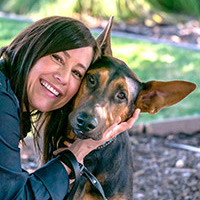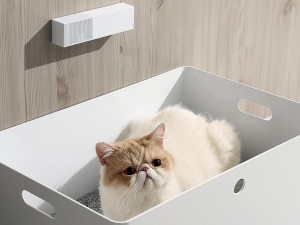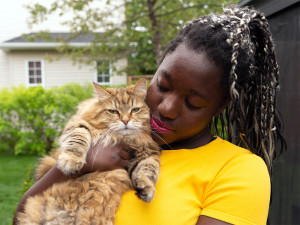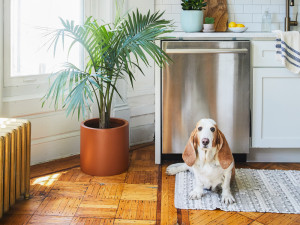Do Hypoallergenic Dogs Really Exist?
Vet Dr Shea Cox separates fact from fiction when it comes to low-shedding breeds

Share Article
Allergy sufferers who want to share their home with a canine companion have been known to drop big bucks on breeds that are touted as ‘hypoallergenic’. These are dogs who are reported to have lower household allergen levels compared to other pooches. But don’t rush to throw out your handkerchief and eye drops – a study suggests that hypoallergenic dogs may be a myth.
Research on ‘hypoallergenic’ dogs
Allergen researchers have found that allergen levels vary among individual dogs but not individual breeds. The American Journal of Rhinology and Allergy reports thatopens in new tab the amount of dog allergens found in households does not vary depending on the breed, and families with ‘hypoallergenic’ dogs are living with the same level of allergens in their homes as people who live with non-hypoallergenic dogs.
The researchers measured the level of the most common dog allergen, Canis familiaris 1, in the homes of 173 families who lived with one dog and found that 163 of them produced measurable levels of Can f 1. The numbers of dogs of each breed were not large enough to allow for analyses by individual breed, but the researchers compared quantities of allergens found in the samples using various categories of purebred and mixed-breed hypoallergenic and non-hypoallergenic dogs. No matter how they did the comparisons – even comparing dogs suggested as being ‘more hypoallergenic’ by the American Kennel Club against all other dogs – they found no statistically significant differences in levels of Can f 1.
Best breeds for allergic pet parents
The American Kennel Clubopens in new tab does not actually recommend or endorse any specific breed, nor does it claim that ‘hypoallergenic breeds’ will not affect people with allergies, but they do suggest canine candidatesopens in new tab who have a “predictable, non-shedding coat” that may benefit allergy sufferers. The list of hypoallergenic dog breeds include dog breeds who don't shed as much (called ‘low-shedding dogs’) like the Afghan Hound, Bedlington Terrier, Bichon Frise, Chinese Crested, Coton de Tuléar, Schnauzer, Irish Water Spaniel, Poodle, Portuguese Water Dog, Spanish Water Dog, Labradoodle, Goldendoodle, Yorkshire Terrier, Maltese and Shih Tzu.
While there is no truly hypoallergenic dog breed, the best dog breeds for people who have allergies are the breeds that have more of a non-shedding coat, which in turn produces less dander, and therefore adds fewer allergens to the environment.
Tips on reducing pet allergies
If there are no real hypoallergenic dogs, what can you do to curb the sniffling and sneezing?
Make sure your pet’s essential fatty acid (Omega-3s) requirements are met. By ensuring your dog has optimal levels of EFAs in their diet, you can reduce shedding and dander associated with EFA deficiency. Adding coconut oil has also been proven to help reduce dander and shedding.
Bathe your pet often – but take special care to use only safe, non-drying herbal animal shampoos. Whatever you do, avoid using people shampoo on your dog, and skip any shampoo containing oatmeal.
Invest in a good-quality hoover designed for households with pets.
Clean your home frequently and thoroughly. Include any surfaces that trap pet hair and dander like couch covers, pillows and pet beds. This will also help control other allergens in your home that could be contributing to the allergic load for family members.
Wash bedding frequently in hot water.
Use washable seat-covers when your dog rides in the car.
Purchase a good-quality air purifier for your home.
If possible, remove carpeting, drapes and other fabric that traps animal dander. Tile or wood floors are much easier to clean of dog allergens.
By following these tips, you may be able to lessen the allergen load in your environment and live more harmoniously with your maybe not-so-hypoallergenic canine companions.

Dr. Shea Cox, DVM, CVPP, CHPV
Dr. Shea Cox is the founder of BluePearl Pet Hospice and is a global leader in animal hospice and palliative care. With a focus on technology, innovation and education, her efforts are changing the end-of-life landscape in veterinary medicine.
Related articles
Cat Allergies: Do Hypoallergenic Cats Exist?
If the sniffles are getting you down, don’t stress: you have options
![Basset Hound sitting in a bright sunny apartment beside a potted palm tree]()
Garden Variety: Plants Safe For Our Pups
Boutique New York nursery The Sill gives us the dirt on dog-friendly plants
![A woman sitting on a bed holding a dog close in her arms.]()
Humans + Dogs: The Longest Love Story
How we became human – an ongoing exploration
![Golden Retrieve dog running in the grass outside, playfully chasing a flirt pole held by a man in blue jeans]()
Your Dog Is Bored. Here’s How to Solve That
Get out the toys and puzzles






